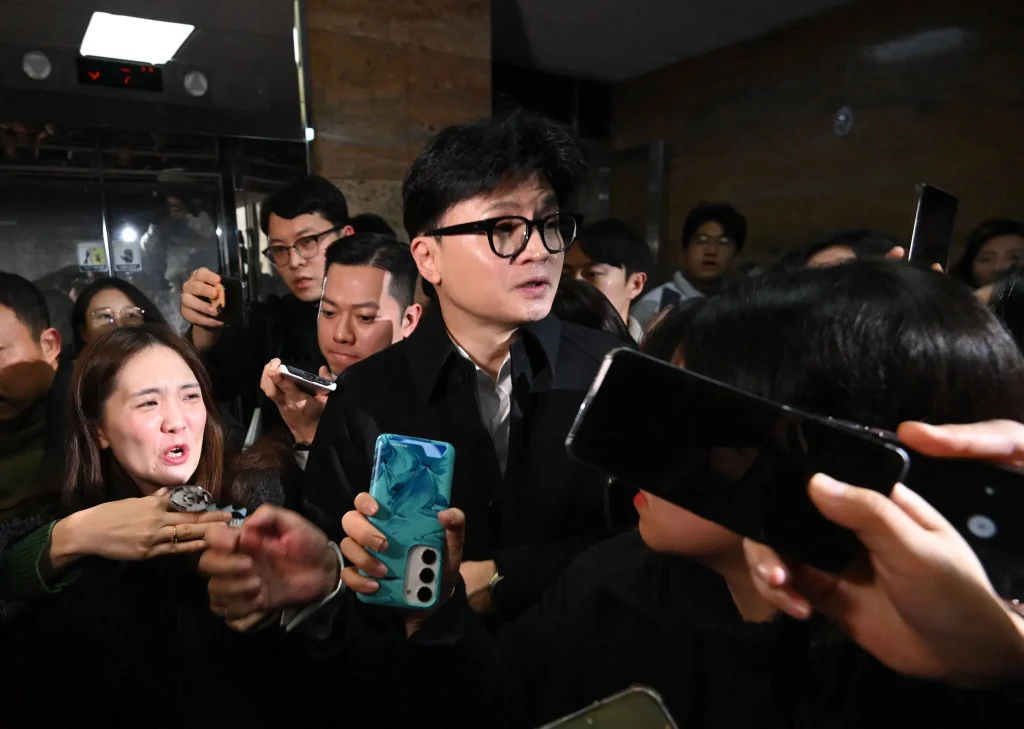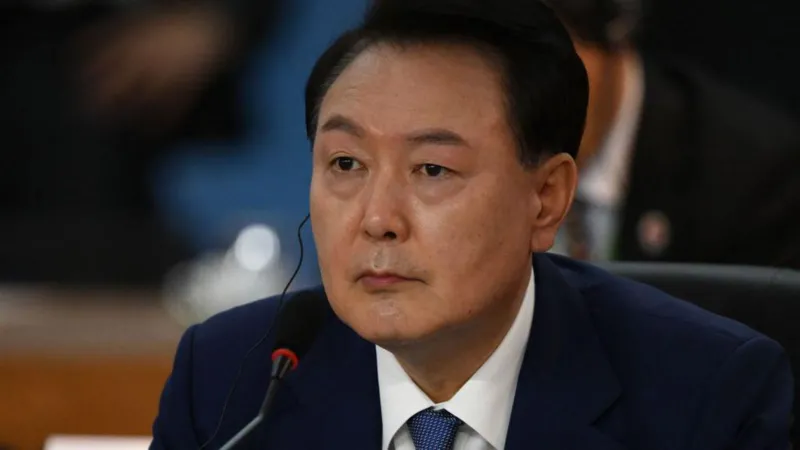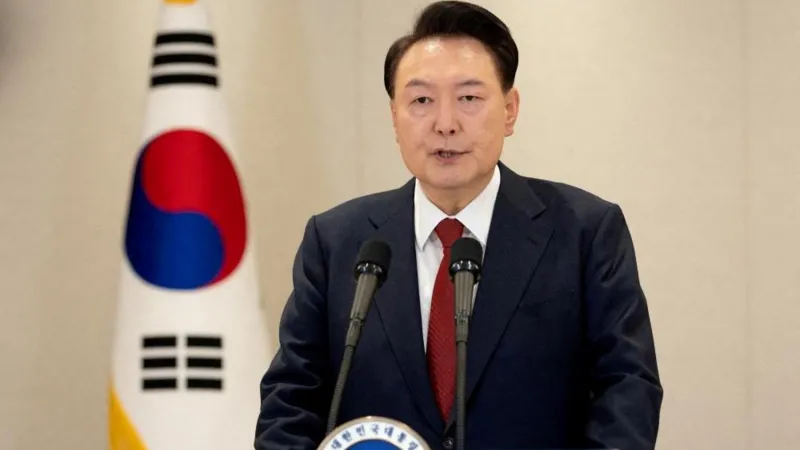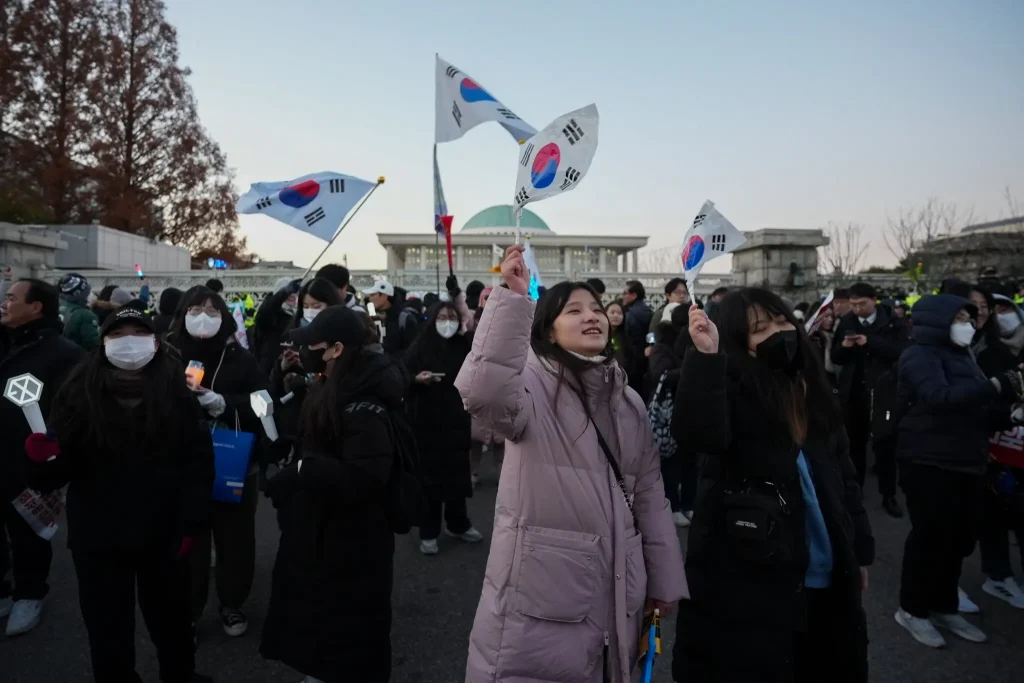South Korea’s president avoids impeachment after martial law misstep
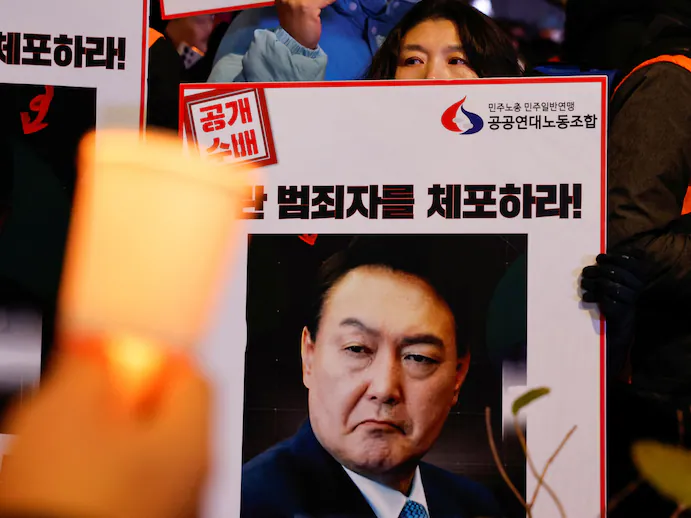
In a dramatic turn of events, South Korea’s president has narrowly avoided impeachment after making a controversial statement regarding the potential implementation of martial law. The remarks sparked a political firestorm, with critics accusing President Yoon Suk-yeol of overstepping his authority and undermining democratic principles. However, after intense political debates and a series of legal reviews, the impeachment motion was dismissed, allowing the president to remain in office.
The Martial Law Controversy
The controversy began when President Yoon Suk-yeol made a statement in which he suggested the possibility of imposing martial law during ongoing protests in the country. These protests had erupted over a variety of issues, including labor rights, economic policies, and the government’s handling of certain domestic matters. While such discussions are not uncommon in times of political unrest, the suggestion of martial law raised alarm among many citizens, opposition lawmakers, and human rights groups, who saw it as an attempt to stifle dissent and curtail freedoms.
Martial law in South Korea, as in many other democracies, is a highly sensitive topic. Historically, it has been used as a tool of authoritarian control, particularly during periods of political instability or protests. South Korea’s experience with martial law dates back to its authoritarian era under military leaders, where the government would impose such measures to suppress opposition. As a result, the mention of martial law by a sitting president is seen as a serious and troubling development for many South Koreans, given the country’s painful history of military rule and its ongoing commitment to democracy.
In his remarks, President Yoon explained that the potential for martial law would only be considered if the protests became violent or posed a significant threat to national security. However, the lack of clarity in his statement, combined with the inflammatory nature of the suggestion, led to widespread concern. Critics argued that it was an irresponsible statement that could be interpreted as a threat to the democratic process and the right to peaceful protest.
Political and Public Reaction
The president’s comments quickly gained traction in the media, sparking public outrage and intense political debate. Opposition parties, in particular, seized on the statement, accusing Yoon of overstepping his constitutional authority. They argued that such a statement undermined the democratic principles that South Korea had worked so hard to build since the end of its authoritarian regime in the late 20th century.
Public protests against the president’s remarks soon followed, with demonstrators gathering in major cities to demand a retraction of the statement and an apology from Yoon. Many citizens expressed concerns that his comments could lead to a crackdown on dissent and undermine the rights of ordinary South Koreans to express their opinions without fear of government retaliation.
The opposition also mobilized politically, calling for impeachment proceedings against the president. Impeachment is a serious process in South Korea’s parliamentary system, requiring the National Assembly to pass a motion by a two-thirds majority. If successful, the motion would lead to the president’s removal from office, effectively putting an end to his presidency. However, the impeachment process is highly complex and requires careful legal consideration to determine whether the president’s actions or remarks constitute grounds for removal.
Legal and Constitutional Review
In response to the political pressure and growing public concern, South Korea’s Constitutional Court and legal experts began reviewing the president’s remarks to determine whether they warranted an impeachment motion. The court, along with independent legal bodies, closely examined the situation to assess whether Yoon’s statement violated South Korea’s Constitution or the principles of democracy and human rights.
The Constitutional Court’s review was particularly focused on determining whether the president’s comments represented an abuse of power or a direct threat to the democratic process. Ultimately, the court concluded that Yoon’s remarks, while concerning and poorly timed, did not meet the legal threshold required for impeachment. In particular, the court found that the president had not directly violated the Constitution or engaged in criminal misconduct.
Despite the ruling, many critics remained dissatisfied with the outcome, arguing that the president’s statement was irresponsible and should have been met with stronger political consequences. However, legal experts emphasized that impeachment proceedings require clear evidence of constitutional violations or abuse of power, and in this case, the court determined that Yoon’s remarks fell short of those standards.
The Dismissal of the Impeachment Motion
After much debate and legal scrutiny, the National Assembly voted on the impeachment motion. The result was a decisive vote against impeachment, with a majority of lawmakers concluding that the president’s comments did not warrant his removal from office. The ruling was a significant victory for President Yoon, allowing him to remain in power despite the controversy surrounding his remarks.
The vote did, however, highlight the deep political divisions within the South Korean legislature. While Yoon’s supporters defended his right to express his concerns about public unrest and national security, the opposition remained vocal in their criticism of the president’s handling of the situation. The vote underscored the ongoing tension between the executive branch and opposition parties, which has been a feature of South Korea’s political landscape since Yoon assumed office.
The outcome of the impeachment motion has also prompted discussions about the broader state of democracy in South Korea. While the dismissal of the motion allowed the president to avoid immediate political fallout, it raised questions about the checks and balances within the political system. Critics argued that the incident demonstrated the challenges of holding public officials accountable when they are in power and have strong political support.
Lessons and Political Implications
Although President Yoon Suk-yeol avoided impeachment, the martial law controversy has left a lasting mark on South Korean politics. The incident has spurred renewed discussions about the limits of executive power and the importance of maintaining a robust system of checks and balances in a democracy.
In the wake of the controversy, there have been calls for greater transparency and clarity from political leaders when discussing sensitive issues such as martial law. Some political analysts suggest that Yoon’s comments were a reaction to the growing frustration with persistent protests and social unrest. However, the incident has highlighted the delicate balance that must be maintained between preserving national security and protecting the fundamental rights of citizens to express their opinions.
Additionally, the controversy over martial law and the subsequent impeachment motion has served as a reminder of the volatility of South Korean politics. The country’s democratic institutions, while strong, are still subject to political pressure, and the relationship between the executive, legislature, and judiciary remains complex. The episode has underscored the importance of maintaining dialogue and trust between political institutions to ensure that South Korea’s democracy continues to function effectively.
South Korea’s president, Yoon Suk-yeol, has narrowly avoided impeachment following his controversial remarks about the potential imposition of martial law. While the ruling was a victory for the president, it has also ignited debates about executive power, national security, and the protection of democratic principles in the country. The incident serves as a reminder of the fragile nature of democracy and the ongoing challenges faced by political leaders in balancing the need for public order with respect for individual rights. Moving forward, the country will need to carefully consider how best to navigate these complex issues to maintain the integrity of its democratic system.


